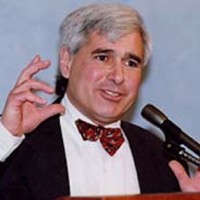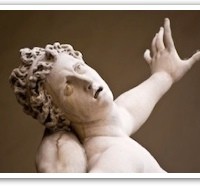Ten Conservative Books Revisited, by Gerald J. Russello
In 1986, Russell Kirk gave a lecture titled “Ten Conservative Books” in which he identified ten important books that distilled or expressed conservative principles, from Burke’s Reflections on the Revolution in France to T. S. Eliot’s Notes Towards the Definition of Culture, the book Kirk pressed upon the hapless Richard Nixon. The essay is worth reading not only for the book suggestions but also for what Kirk has to say about the role of books in the culture; as a bookish person himself, Kirk valued tomes highly, and having been in his library—a converted factory near his ancestral Piety Hill home—there is no question that Kirk was a bibliophile.
Yet Kirk recognized that “It is possible for books to comment upon custom, convention, and continuity; but not for books to create those social and cultural essences. Society brings forth books; books do not bring forth society.” Cultural renewal must occur at the level of the person, family, and community; books can help that process, but wise books come from societies that value and reflect upon wisdom; rarely the other way round.
With that in mind, there is some merit in supplementing Kirk’s list a quarter century on, so herewith my choices for ten conservative books.
1. Joseph Roth, The Radetzky March. In his list, Kirk abjured fiction, although in passing he recommended some authors such as Robert Louis Stevenson and Nathaniel Hawthorne. The Radetzky March covers the period leading up to the dissolution of the old European Order before, and as a result of, World War I. Like Giuseppe Lampedusa’s The Leopard, Roth is clear-eyed about the Austro-Hungarian Empire and its many flaws, but equally clear-eyed about what he calls the “bestial” promise of an order that had ripped aside its traditions.
2. Patrick Leigh-Fermor, A Time for Gifts. Leigh-Fermor, who died recently, was in some sense the highest product of the tradition whose destruction Roth lamented. A polymath, courageous soldier (he led a British commando unit in occupied Crete during World War II), and elegant writer, Leigh-Fermor as a young man walked through Europe to Constantinople, just as Nazism was rising on the Continent. This book, the first volume of two covering the journey, describes a pre-Internet, pre-EU Europe of deeply local customs and perspectives, a collage of nations that is almost impossible for us to imagine; almost, because Leigh-Fermor’s prose makes such imagination possible.
3. Christopher Dawson, Religion and the Rise of Western Culture. The Europe Roth and Leigh-Fermor describe was a disparate set of people bound together by a common faith. How that faith—which itself came from outside Europe, bearing with it the markings of Israel and the Near East—came to shape Europe is described in this book, written by one of the twentieth century’s greatest Christian historians.
4. John Lukacs, Last Rites. After Dawson Lukacs is perhaps the historian every conservative should read. Lukacs—a Hungarian refugee to the United States—has written a series of books articulating a defense of European and specifically Anglo-American civilization. He is no mindless defender of right-wing orthodoxy—far from it. But his perspective on patriotism and the moral nature of history, among many other subjects, makes this book—a follow up to his amazing first volume of memoirs, Confessions of an Original Sinner—a perfect introduction to his other works, including the indispensable Historical Consciousness, which explodes every progressive myth about historical thinking you can imagine.
5. Russell Kirk, The Conservative Mind. Although Kirk did not include his own works in his listing, now, some five decades on, his masterpiece, The Conservative Mind, needs to be read by anyone seeking to understand the conservative tradition. As David Frum once wrote, Kirk as much created as discovered the conservative intellectual tradition, which he traced from Edmund Burke to Eliot. And it is that tension between preservation and innovation that lay at the heart of Kirk’s project, a tension that Kirk navigated through reverence for the past but also the consistent application of imagination to the problems of the present
Read the complete article in The University Bookman
Why should businessmen read great literature?, by Vigen Guroian
In every society, power must be humanized and used morally in order that free and civilized life might prosper. And in a commercial society, businessmen and businesswomen wield especially great power and are frequently called into roles of civic and political leadership. This fact makes the question that serves as this essay’s title especially significant. A half-century ago, Russell Kirk, author of The Conservative Mind, penned an article titled “The Inhumane Businessman.” Kirk did not argue that businessmen are, as a lot, more inhumane, mean, or cruel than the average bank clerk, schoolteacher, or construction worker. But he was persuaded that businessmen are “deficient in the disciplines which nurture sound imagination and strong moral character,” and that this does not augur well for the nation.
Kirk lamented the turn to business education in our colleges and universities, which, he argued, contributes to the cultural illiteracy of the business class. This trend toward specialized business education accelerated during the concluding decades of the twentieth century, leaving fewer and fewer of those engaged in business educated in the liberal arts. That is a principal reason why businessmen so often do not read great literature. So this is where I shall begin.
Imagining larger possibilities and purposes
Kirk was right. By the 1950s, higher education in North America had begun to buy into business education, so to speak, and replace liberal studies with this glamorized version of vocational training. Colleges certainly did not heed C. S. Lewis’s admonition that “if education is beaten by training, civilization dies.” Even earlier in the century, G. K. Chesterton published an article in the London Illustrated Times, titled simply enough “On Business Education,” in which, in his acerbic manner, he summed up the scandal and hinted at its consequences: “Modern educators begin by stuffing the child, not with the sense of justice by which he can judge the world, but with the sense of inevitable doom or dedication by which he must accept that particular very worldly aspect of the world.”
For many years, I taught core curriculum courses in ethics, literature, and theology at a college in which more than a third of the students were business majors. And I saw over more than twenty years how business “training” sucked these students dry of idealism and replaced it with the crudest forms of pragmatism, utilitarianism, and fatalism. The light in their eyes had already begun to dim and flicker before they had finished their fourth year, a dreadful thing to witness. Despite my efforts and those of other teachers in the humanities, many men and women departed the college with no sense of the meaning or value of a liberal arts education. Nor had they acquired the habits of reading that are historically associated with such an education. I have reason to believe that this is not an isolated phenomenon; experience elsewhere since then suggests that it is equally true of business school students around the nation.
This deficiency is debilitating in ways that are wholly overlooked by much of society, including the parents of my students. For if these young men and women learned the meaning and value of the liberal arts, they would leave college with the answers to two questions that, as it turns out, they hardly know how to ask, let alone answer. First, “Why should I read great literature throughout the rest of my life?” Second, “Why am I choosing to spend my life in business?”
They cannot answer the second question satisfactorily because they are not encouraged in college (or even permitted, in many cases) to read and love the great literary masters. Aristotle, Dante, Shakespeare, Dostoevsky, and Eliot teach us to imagine larger possibilities and purposes for our lives. They test our decisions with the moral wisdom of humankind. They ask us to move through the world with discernment. They show us that we possess the freedom to make of our lives what we will and not what others choose for us, what the fates decide, or what historical forces dictate.
Read the complete article in The Clarion Review
A Summer With Virgil, by Bruce Thornton
From Homer’s Iliad to Thucydides’ Peloponnesian War, these five classics make for sublime and delightful beach reading.
“To read the Latin & Greek authors in their original,” Thomas Jefferson once wrote, “is a sublime luxury.” Fortunately, for those who don’t read Greek and Latin, the great works of Classical literature are available in first-rate translations. The following five classics are some of the best works from the astonishing variety and brilliance of Greek and Roman literature.
![]()
Homer, Iliad
The first work of Western literature was written around 750 B.C. The Iliad tells the story of only a few weeks from the ten years of the Greek war against Troy, ignited when Helen ran off with the Trojan Paris. But the Iliad is more than just a celebration of war and martial valor. To be sure, Homer’s admiration for men who will risk their lives in war for eternal glory is obvious, and his descriptions of fighting and dying are still some of the most vivid portraits of men at war we have.
But the Iliad offers much more: At its heart, it is a profound examination of what is best and worst in human nature, of what binds people together into a community and what tears them apart with bloody violence. As Homer tells the story of the “baneful wrath” of Achilles, the “best of the Achaeans,” over his dishonor at the hands of the ruler Agamemnon, he brilliantly shows us the destructive effects of the hero’s code of honor and vengeance against those, even friends, who fail to acknowledge his excellence and great deeds. Achilles’ quest for revenge, driven by a passionate anger he cannot control, in the end sacrifices his own community, his most beloved friend, and ultimately his own humanity. Homer teaches us that no society can survive when its ideals are based on personal honor and glory achieved through violence. Human community and human identity both depend on the “ties that bind,” the mutual obligations and affections we all, even the most brilliant of us, owe one another by virtue of being born into a tragic world of change, loss, and death.
Long before Aristotle, then, Homer understood that we are “political animals,” unable to live without our fellow humans because of our existential dependence on others. In the end, as we see in the moving scene in which the enemies Achilles and Priam, king of Troy, weep together over their lost loved ones, Homer teaches us that despite what divides us — no matter how exceptional our achievements and talents — it is our common subjection to time and death, and our dependence on other people we love and lose, that make us, for all our bestial passions, more than animals, and better than the immortal gods.
Read the complete article in CERC

